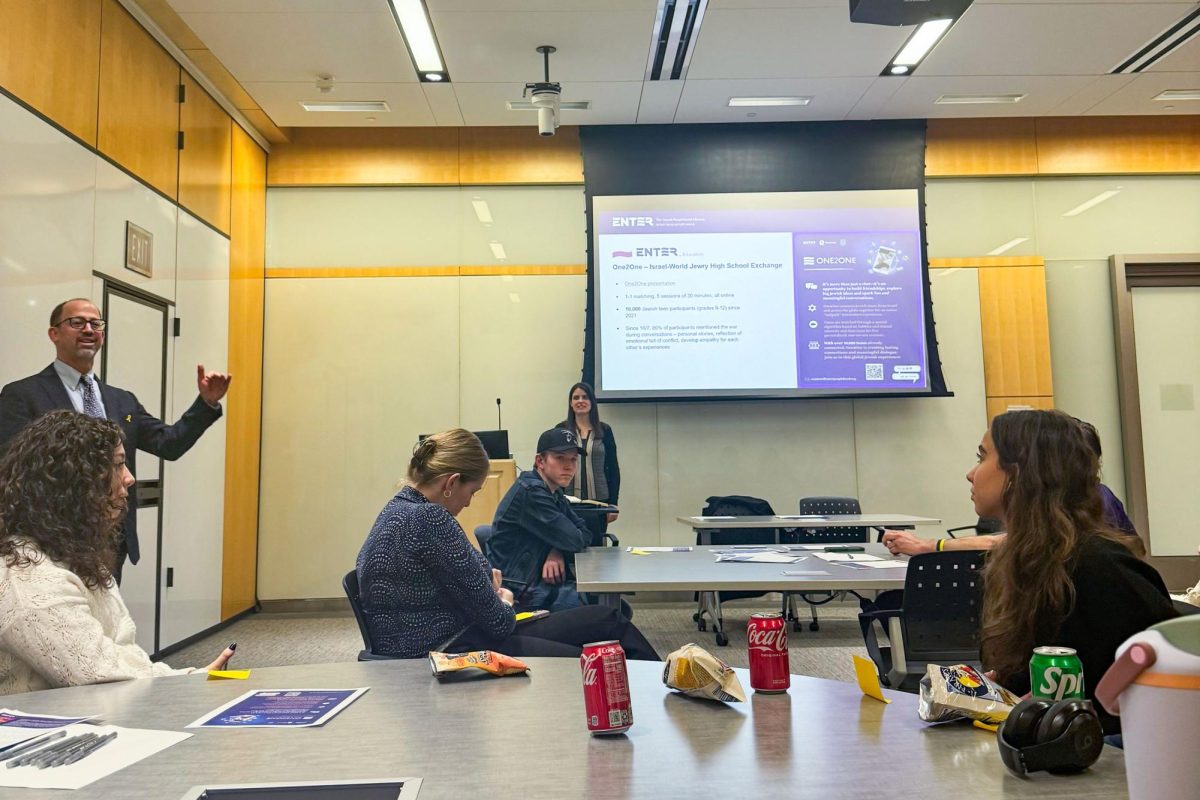Members of a Jewish advocacy organization discussed the value of higher education institutions offering programs that foster a sense of unity among Jewish Americans and Israelis at a discussion-based event on Thursday in the Science and Engineering Hall.
Scott Lasensky and Amanda Bekkerman, both representatives from ENTER: The Jewish Peoplehood Alliance spoke about educational programs that work to unite Jewish communities from around the world. The event was part of an annual lecture series titled “Conversations That Matter,” and was sponsored by the Graduate School of Education & Human Development, the Mayberg Center for Jewish Education and Leadership, GW Hillel, GW for Israel, Jewish on Campus at GW and Chabad GW.
Lasensky, a senior advisor for ENTER and a professor of Israel and American Jewish Politics at the University of Maryland, discussed how promoting Jewish peoplehood through education and public awareness initiatives can increase solidarity and respect among Jewish communities across the world.
ENTER was founded in 2019 by philanthropists Charles Bronfman and Jeffrey Solomon and a coalition of foundations and leaders from Israel and the Jewish Diaspora with the goal of building a “peoplehood-aware” generation of Israelis and to intensify connectivity with Jewish communities outside Israel through educational programs.
Lasensky said Jewish peoplehood refers to a shared identity regardless of where they live or how devoutly they practice their religious beliefs. He said the idea attempts to “stretch its arms around” all Jewish people and be “as expansive” as possible in order to bring people from various regions of the world together through shared Jewish identity.
“The globalized world in which the Jews live is a very fertile setting for peoplehood because it welcomes and draws into multiple identities,” Lasensky said.
Lasenksy said in the weeks following Hamas’ Oct. 7, 2023 attack on Israel, media outlets began frequently referencing the phrase “Jewish peoplehood,” which led to an “explosion” of the term in social settings.
Lasenksy said incorporating peoplehood into the ENTER Dare to Ask and One2One educational programs came after numerous “moments of crisis” in the Jewish community over the past decade, where many Jewish leaders felt that the community was becoming increasingly pulled apart by differing partisan politics and ideological beliefs.
“People we work with gathered to find an idea, that’s a bold idea that we could rejuvenate and put some new energy around,” Lasenksy said.
Bekkerman, the manager of North American operations for ENTER, said the organization primarily promotes the idea of peoplehood through the One2One educational program, which matches Jewish, non-Israeli and Israeli teens to engage in a series of one-on-one video discussions focused on a shared Jewish identity, common interests and Jewish life.
“We’ve realized that this method of using technology to connect people is really effective and could be used for other audiences so we actually are working on an expansion of the project and of the one-to-one model to bring it to other audiences, could be college students,” Bekkerman said.
Bekkerman said over 10,000 Jewish teenagers ranging from grades nine to 12 have participated in the program since 2021, and considering the continued challenges of travel to Israel during the war in Gaza, the program’s online base has proven beneficial.
“It’s certainly not a replacement for travel to Israel, but it can certainly enhance the experience and be seen as a complement to continuing to travel to Israel when possible,” Bekkerman said.
Bekkerman said the One2One program is “infused” with the ideology of peoplehood, as participants meet virtually as “equals, just from two different Jewish societies” and become more knowledgeable about their partners and society on the other side of the world.
“Personal stories of reflection about what it’s like living in Israel, but also what it’s like living in the U.S. and the challenges on both sides,” Bekkerman said.





